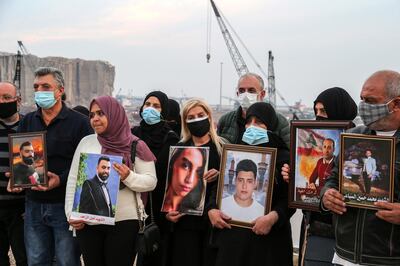Lebanon's Supreme Court has given the green light for an investigation into the deadly explosion that shook Beirut in August to resume.
However, the court has yet to rule on a request to replace the judge leading the investigation.
Mr Fadi Sawan, the judge leading the probe, had suspended the investigation a week after charging caretaker Prime Minister Hassan Diab and three other former ministers with negligence over the blast that killed more than 200 people.
The disaster destroyed large parts of the capital.

Mr Sawan’s decision to pause the investigation followed a request to transfer the case to another judge. The request was put forward by former finance minister Ali Hassan Khalil, and former public works minister Ghazi Zeaiter, both members of Speaker Nabih Berri’s parliamentary bloc.
Both officials, along with Mr Diab had snubbed Mr Sawan’s summons, saying he had no authority to question them under the constitution, which protects members of parliament and ministers from prosecution for decisions made in their line of work.
Despite Monday’s ruling, little progress is expected in the course of the investigation until the Supreme Court rules on the transfer request.
According to legal experts, Mr Sawan didn’t have to suspend the investigation in the first place, pending a ruling by the court.
“Judge Sawan could have proceeded with the investigation unless the court specifically instructed him otherwise, according to the last paragraph of article 340 of the criminal procedural code,” says Paul Morcos, founder and manager of JUSTICIA law firm.
If Mr Sawan chooses to step down or the supreme court rules in favour of transferring the case, Mr Morcos says it will be up to the justice minister and the higher judicial council to appoint another investigative judge.
The investigation has been so far marred by political tension and controversy. The country’s top officials have been trading accusations over who bears responsibility for the explosion of a large stockpile of ammonium nitrate that was stored at Beirut’s port, one of the region’s busiest, for over six years. Five months after the explosion, it remains unclear who owned the chemicals or why they were held at the port for so long.
At the time of writing, Interpol has issued red notices for the Russian owner of a ship, and his compatriot, the ship's captain who unloaded the ammonium nitrate stockpile at Beirut port, as well as a Portuguese trader who inspected the chemicals in Beirut in 2014, Lebanon's National News Agency reported on Tuesday.
The red notices were issued at the request of Lebanese State Prosecutor Judge Ghassan Khoury, the NNA said.
Mr Diab, who previously said the blast involved the explosion of 2,700 tonnes of ammonium nitrate, cast further doubt over the investigation when he recently said the FBI had found that less than a quarter of the chemicals claimed to have been responsible for the explosion at the port actually exploded. He later backtracked on his comment saying it was based on unofficial reports.
The indictment of Mr Diab fuelled tension between President Michel Aoun and Prime Minister-designate Saad Hariri, who called the indictment an “attack” on the post of premier, a position reserved for Sunni Muslims under Lebanon's power-sharing system.
The tensions clouding the investigation have complicated talks over the formation of a Cabinet, leaving Lebanon without a fully functioning government since the explosion forced Mr Diab’s resignation in August.
The international community has pressed Lebanon’s political leaders to swiftly form a Cabinet committed to implementing reforms in exchange for financial support to help the country weather its financial and economic crisis.













